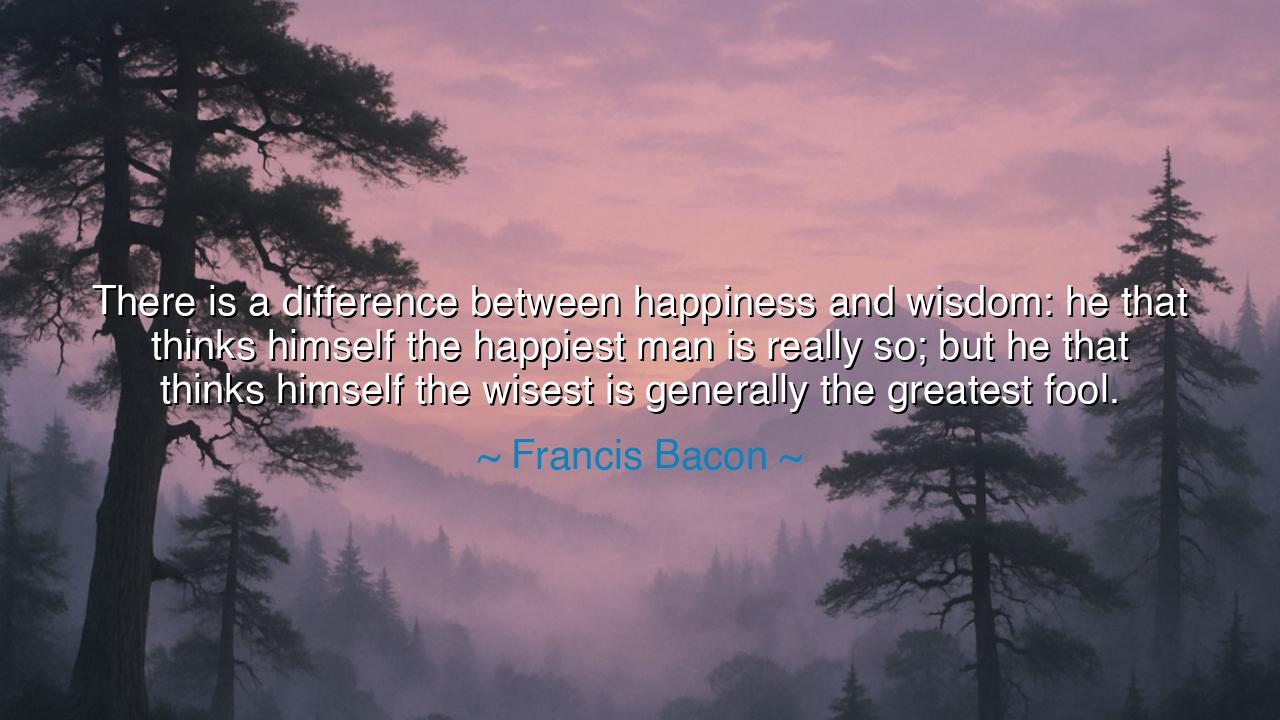
There is a difference between happiness and wisdom: he that
There is a difference between happiness and wisdom: he that thinks himself the happiest man is really so; but he that thinks himself the wisest is generally the greatest fool.






“There is a difference between happiness and wisdom: he that thinks himself the happiest man is really so; but he that thinks himself the wisest is generally the greatest fool.” Thus spoke Francis Bacon, philosopher, scholar, and one of the founding minds of modern thought. His words, though written centuries ago, still shine with the fire of truth. They reveal the delicate balance between contentment and humility, between the heart that finds peace in simplicity and the mind that grows proud in its knowledge. Bacon, who spent his life searching for the nature of truth, knew better than most that wisdom, once claimed, is often lost; while happiness, once accepted, becomes real.
In these lines, Bacon draws a sacred distinction between two human pursuits: the desire to know and the desire to be content. The first, wisdom, is noble but dangerous, for it tempts the soul toward pride; the second, happiness, is humble and pure, for it asks only to rest in gratitude. To think oneself wise is to close the door of learning; but to think oneself happy is to open the door of joy. The wise man, if he truly be wise, knows that wisdom is endless and that no mortal can contain it. The fool, however, declares himself enlightened and sees only his own reflection. The happy man, by contrast, finds satisfaction not because the world is perfect, but because he accepts it as it is.
Bacon’s own life gives weight to his words. A man of great intellect, he rose to power in the English court, but ambition led to his downfall. Accused of corruption and stripped of office, he was left in disgrace. Yet in his later writings, one senses that he had discovered a gentler truth: that peace comes not from greatness or recognition, but from inner contentment and humility. The philosopher who once sought to master nature came, in the end, to admire the beauty of human frailty. Perhaps it was this journey—from pride to humility, from wisdom to simplicity—that birthed this saying. For he who has lived through the rise and fall of his own genius knows that true happiness does not depend on status, and that true wisdom is never self-proclaimed.
The ancients, too, understood this paradox. Socrates, when hailed as the wisest man in Athens, replied that his only wisdom was in knowing that he knew nothing. It was this humility that made him truly wise. Yet many who heard him mistook confidence for knowledge, and knowledge for wisdom. So it is with every age: those who shout the loudest about their insight are often blind to their own ignorance, while those who walk humbly in gratitude find themselves closest to truth. The fool boasts of wisdom and becomes enslaved by pride; the happy man rejoices in what he has and becomes free.
There is something divine in this difference. Happiness is a matter of perception—it lives in the heart, not in circumstance. If a man believes himself content, he is so, for the mind shapes its own reality. But wisdom requires an endless hunger, a humility that few can bear. The moment one declares, “I am wise,” he steps away from the path of learning, for pride has blinded him. In this way, Bacon warns us that the illusion of wisdom is the most dangerous ignorance of all. The truly wise man doubts himself daily; the fool, believing himself beyond error, stumbles into ruin.
The lesson, then, is this: seek happiness in gratitude, and wisdom in humility. Do not boast of your knowledge, for the universe is too vast for mastery. Instead, let curiosity guide you, and be gentle in judgment. And when you find contentment, do not question it—embrace it, for in that acceptance lies the secret of peace. The one who believes himself happy will live joyfully; the one who believes himself wise will live vainly. Better to be joyful in simplicity than proud in illusion.
To live by Bacon’s teaching, practice quiet reflection. Each day, ask yourself not, “Am I wise?” but “What more can I learn?” And when you are tempted by dissatisfaction, remember the blessings already in your hands. Be as the humble traveler who, though his road is long, finds joy in the sunlight and the breeze. For knowledge may elevate the mind, but gratitude exalts the soul.
So let this wisdom be written upon your heart: the happy man lives in truth, for he has accepted it; the wise man, if he calls himself wise, lives in illusion, for he believes he has captured what cannot be captured. Be content, therefore, in wonder, and humble in knowledge. For in the stillness of gratitude, you will find both joy and wisdom—and in claiming neither, you shall possess them both.






AAdministratorAdministrator
Welcome, honored guests. Please leave a comment, we will respond soon